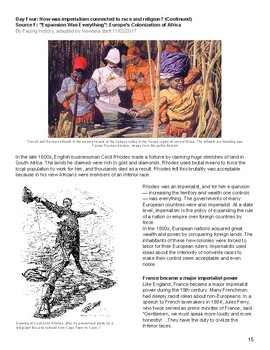The Rise of Imperialism Unit Plan, Readings, Activities & Quiz (Old Curriculum)
- PDF
- Easel Activity
Description
This is free since it is very old and is curriculum I threw together to help me get through my first year of World History. After teaching it for a few years I have updated my curriculum to be more rigorious and engaging, so I offer this free to you as help to get you through the year. Hopefully this saves you some time and if you like it you will check out my more recent curriculum. :)
This Imperialism Reading Packet includes graphic organizers for every reading and a unit guide to help you plan. It is intended to be used instead of a textbook for more enriching and engaging curriculum, but could be used as supplemental reading also.
This unit includes a vocabulary quiz, as well as primary and secondary source inquiry. Everything is done for you and ready for you to print.
PERFECT FOR DISTANCE LEARNING!
PRINT & GO! Or upload to your digital classroom.
Objective: Identify the historical causes of this wave of imperialism, particularly economic, political, technological, and ideological factors; analyze how these factors operated as causes and how they reinforced each other.
Day 1: Causes of Colonization Students will list several factors which led to the Scramble for Africa. Most had to do with developments in Europe rather than in Africa.
Day 2: How did Colonization Work Student will explore the impact of the Berlin Conference on the African people, culture, government, and customs of Africa and will write write about the legacy colonization left behind
Day 3: Primary Sources: An Investigation Into Congo Colonialism Students will read two primary source documents to uncover the cruelty experienced by the colonized
Day 4: Expansion Was Everything": Europe's Colonization of Africa Students will write about how race was an influential factor in the colonization of Africa
Day 5: When the British Ruled India Students will write about how race was an influential factor in the colonization of Africa
Day 6: What Gandhi can teach today’s protesters Students will read a modern day article about what today’s protesters can learn from passive resistance
Day 7: Justification of Colonization and Imperialism Students will read White Man’s Burden and compare it to the history told in a secondary source
Day 8: Social Darwinism Students will write about the concept of Social Darwinism in American society and how it was employed to justify imperialism.
Day 9: Empire Building: The United States and the Caribbean Students will read about the Panama Canal and the injustices that occurred during its construction
Day 10: Latin America Wanted Independence from Spain Students will read about the racism in Mexico and the other factors that lead people to desire independence
Day 11: Opium Wars Students will learn how opium played a role in Britain’s imperialism in China.
Day 12: Boxer Rebellion Explain the causes and effects of the Boxer Rebellion, then evaluate whether the revolt moved China closer to or further away from independence.
Day 13: Science, Colonialism and Genocide Students will read a recent article arguing the racist thinking of colonialism lead to eugenics and later genocides
Vocabulary Quiz
BELOW IS NOT INCLUDED (BUT YOU CAN BUY ON MY PAGE TO MAKE A COMPLETE UNIT)
Day 14: Great Revolution Leaders Poster Project Students will explore leaders that were able to inspire revolutions against colonist aggressions. ● China- Sun Yat-sen ● Cuba- José Martí ● Ethiopia- Menelik II ● Venezuela- Simón Bolívar
Day 15: Mexican Revolution Simulation Students will explore the causes and effects of the Mexican Revolution on different people, as well as read biographies of major players.
CA Frameworks Met:
Describe the rise of industrial economies and their link to imperialism and colonialism (e.g., the role played by national security and strategic advantage; moral issues raised by the search for national hegemony, Social Darwinism, and the missionary impulse; material issues such as land, resources, and technology).
- 2. Discuss the locations of the colonial rule of such nations as England, France, Germany, Italy, Japan, the Netherlands, Russia, Spain, Portugal, and the United States. 3. Explain imperialism from the perspective of the colonizers and the colonized and the varied immediate and long-term responses by the people under colonial rule.
- 4. Describe the independence struggles of the colonized regions of the world, including the roles of leaders, such as Sun Yat-sen in China, and the roles of ideology and religion.






